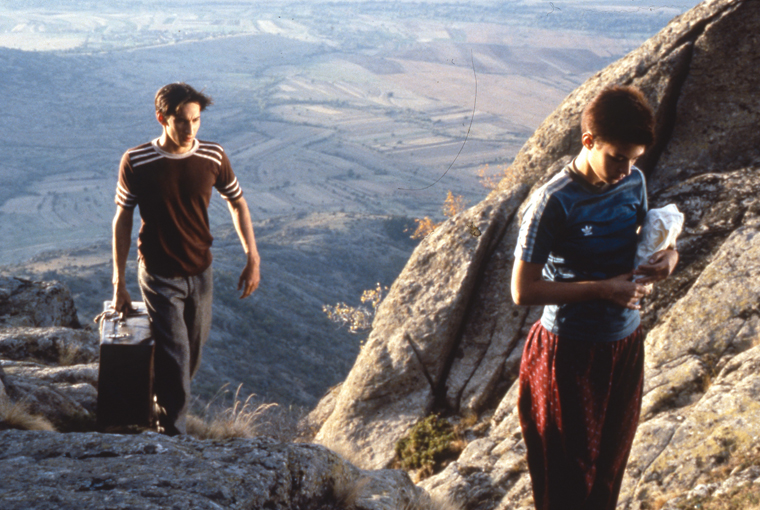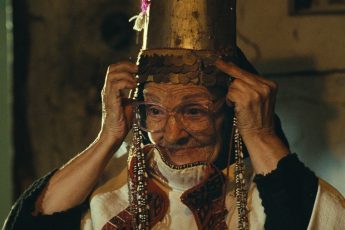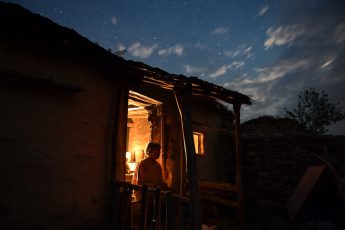
Milcho Manchevski’s directorial debut Before the Rain from 1994 is set around the Yugoslav Wars (1990s). Like Mothers – Manchevski’s latest piece -, the film is split up into three parts, the episodes being loosely intertwined. The first segment tells the story of a youthful monk who leaves his monastery when he falls in love with a young Albanian girl. The girl – short-haired and shy – is on the run from a gang of crooks who want her killed. Though the two manage to escape the gang, they fall into the hands of some Albanians (including the girl’s grandfather) who are not willing to let the girl go with the “Christian scum.” In the heat of the moment, the girl is shot fatally. From the beginning, the film is highly stylized, with the admittedly beautiful landscapes somewhat distorted by the TV-like color correction and the over-present scoring. The second episode takes place in London, but Manchevski is keen on telling us that one is not safe from danger here, either. The story revolves around Aleksander, an acclaimed photographer who reported from the war in Bosnia, and Anne, a middle-aged British woman drawn between her marriage, and Aleksander’s intrusive charm. Over dinner, Anne tells her husband that she wants a divorce, when a man (Yugoslav, it seems) enters the restaurant and begins shooting at the crowd, killing Anne’s husband. It is the second time in the film that a scene of great emotional tension is overshadowed by an act of violence, and the third time shall follow near the end of the film, when Aleksander shows remorse for an act he had triggered when reporting from the war. Aleksander had complained to a Bosnian soldier about not getting satisfying images. The soldier answered his complaint and shot a prisoner right in front of Aleksander’s lense, the incident haunting Aleksander since then. But Manchevski gives his character a second chance, and in a biblically symbolic act that surmounts the logic of time and space, Aleksander sacrifices himself for the life of a stranger…
Unfortunately, the characters in Manchevski’s film are comically overdrawn (most notably the gang members who are after the Albanian girl and look like they are taken from a Mad Max movie), the film somehow achieving the impossible in making the reality of war noncredible. Although Manchevski clearly intended to show the absurdity of the war, the fact that the recurring violent outbursts are neither satisfyingly psychologized nor narrativized makes them rather unlikely. Moreover, it is not entirely clear what exactly Manchevski tried to convey in his film. We are told that violence is bad, but a character in the film also says that there are more shootings taking place in Britain and the US than there are in Macedonia (Macedonia stayed relatively peaceful throughout the Yugoslav wars). What then, is Manchevski’s message? If it is safer at “home” than it is in the West, what does that tell us about our world, and about the conflict depicted? The real issue of Before the Rain is not its music or its suggestive kitschiness, but its textual inconsequence. The film is full of neglected, trivial lines as well as arbitrary biblical motives, left behind for the dogs (or the critics) to pick up and chew on. During the London segment, the camera pans over a wall that reads “Time never dies / The circle is not round,” an idea that is also mentioned by a priest in the film. In moral philosophy, Kant called such “plung[ing] into the transcendent” mysticism (The Critique of Practical Reason), a feature that seems closer to Manchevski’s film than he may like. Of course, cinema is not the same as moral philosophy, but if anything, that should remind us of the danger of employing ‘philosophical’ statements on screen. If all that Manchevski is trying to tell us is that one must break the ‘circle’ of violence to bring about change, he would be well-advised to find other ways to convey that message than summoning boastful quotes.
Critics in the US (mostly supportive) might have been a little awestruck by the topic the film deals with. Though it is surprising that Roger Ebert (Chicago Sun Times), Edward Guthmann (SF Chronicle) and Janet Maslin (NYTimes) found the minute parallels between Before the Rain and Pulp Fiction in structure noteworthy, there is one decisive difference that they failed to point out: Manchevski sets the stakes higher than Tarantino. Unlike Tarantino, he deals with real violence, thus approaching it with a different tone than the characters in Pulp Fiction do. But even so, in criticism it is important to distinguish between the artistic quality of a film (however difficult to assess it may be), and that film’s political stance towards a topic. The question to be answered is an important one: what role should art play in our society? Luckily, in good political films it is never an either or, but rather a side by side. It is no surprise, then, why Manchevski’s characters should blunder around in a world of ambiguous and empty messages, a world where time is eternal and circles are not round.




Leave a Comment